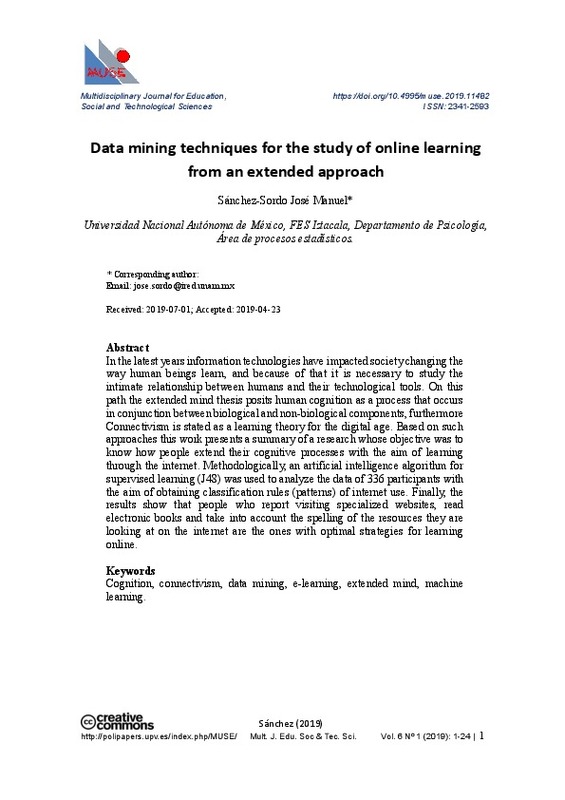Apud, I. (2014). ¿La mente se extiende a través de los artefactos? Algunas cuestiones sobre el concepto de cognición distribuida aplicado a la interacción mente-tecnología. Revista de Filosofí. 39 (1), 137-161. https://doi.org/10.5209/rev_RESF.2014.v39.n1.45618
Castañeda, L., & Adell, J. (2013). Entornos personales de aprendizaje: claves para el ecosistema educativo en red. Alcoy: Marfil.
Clark A. (2001) Mindware: An Introduction to the Philosophy of Cognitive Science. Oxford: Oxford University Press
[+]
Apud, I. (2014). ¿La mente se extiende a través de los artefactos? Algunas cuestiones sobre el concepto de cognición distribuida aplicado a la interacción mente-tecnología. Revista de Filosofí. 39 (1), 137-161. https://doi.org/10.5209/rev_RESF.2014.v39.n1.45618
Castañeda, L., & Adell, J. (2013). Entornos personales de aprendizaje: claves para el ecosistema educativo en red. Alcoy: Marfil.
Clark A. (2001) Mindware: An Introduction to the Philosophy of Cognitive Science. Oxford: Oxford University Press
Clark, A. (2008). Supersizing the mind: Embodiment, action and cognition extension. Oxford: Oxford University Press. https://doi.org/10.1093/acprof:oso/9780195333213.001.0001
Clark, A., & Chalmers, D. (2011). La mente extendida. Oviedo: KRK Ediciones. https://doi.org/10.5209/rev_CIYC.2011.v16.1
Downes, S. (2009). The New Nature of Knowledge. Online [Available] https://www.downes.ca/cgi-bin/page.cgi?post=53404
Downes, S. (2011). Connectivism and Connective Knowledge [Online] Available: https://www.huffingtonpost.com/stephen-downes/connectivism-and-connecti_b_804653.htm
Fayyad, U. (1997). Data Mining and Knowledge Discovery in Databases: Implications for Scientific Databases. SSDBM '97 Proceedings of the Ninth International Conference on Scientific and Statistical Database Management , 2-11. https://doi.org/10.1109/SSDM.1997.621141
Garay, U., Lujan, C., & Etxebarria, A. (2013). El empleo de herramientas de la Web 2.0 para el desarrollo de estrategias cognitivas: un estudio comparativo. Porta Linguarum. 20, 169-186.
Head, A., & Eisenberg, M. (2010). How College Students Evaluate and Use Information in the Digital Age [Project information literacy progress report]. Washington, D.C.: University of Washington. https://doi.org/10.2139/ssrn.2281485
Hernández, S. (2010). Uso de estrategias de aprendizaje con apoyo en Internet considerando el género y el nivel educativo. VIII Congreso Iberoamericano de Ciencia Tecnología y Género. Curitiba.
Hutchins E. (1995), Cognition in the wild, Bradford Book.
Hutchins, E. (2000) Distributed cognition, Online [Available]: http://comphacker.org/pdfs/631/DistributedCognition.pdf
Maravita, A., & Iriki, A. (2004). Tools for the body (schema). TRENDS in Cognitive Sciences. 8 (2), 79-86. https://doi.org/10.1016/j.tics.2003.12.008
Márqués P., (2012). Impacto de las TIC En La Educación: Funciones Y Limitaciones, Revista 3CTIC, 1, (3)
Nigro, Xodo, Corti and Terren, (2004), Online [Available]: http://sedici.unlp.edu.ar/handle/10915/21220
Redecker, C. (2009). Review of Learning 2.0 Practices: Study on the Impact of Web 2.0 Innovations on Education and Training in Europe. Bruselas: Joint Research Centre.
Ryle G., (2009). The concept of mind, Rouledge https://doi.org/10.4324/9780203875858
Sánchez-Sordo, J (2019). Redes y cognición; abordando la mente extendida en ambientes conectivistas de aprendizaje, Revista Digital Internacional de Psicología y Ciencia Social, to be published.
Sánchez-Sordo, J. (2014). Conectivismo y ecologías para la educación a distancia en la web 2.0. Revista Mexicana de Bachillerato a Distancia, 6(12), 11. https://doi.org/10.22201/cuaed.20074751e.2014.12.64868
Sancho, F. (2018). Aprendizaje Inductivo: Árboles de Decisión. Obtenido de Universidad de Sevilla: http://www.cs.us.es/~fsancho/?e=104
Siemens, G. (2004). Conectivismo: Una teoría de aprendizaje para la era digital. Madrid: Ediciones Nodos Ele.
Siemens, G. (2006a). Conociendo el conocimiento. Madrid: Ediciones Nodos Ele.
UNESCO, (2006). Hacia las sociedades del conocimiento: informe mundial de la UNESCO. [Available]: https://unesdoc.unesco.org/ark:/48223/pf0000141908 .
UNESCO, (2013). Education for Sustainable Development Goals: learning objectives. [Available] https://unesdoc.unesco.org/ark:/48223/pf0000247444
Vygotsky, L. (1995). Historia del desarrollo de las funciones psíquicas superiores. Madrid: Editorial Visor.
Zapata-Ros, M. (2015). Teorías y modelos sobre el aprendizaje en entornos conectados y ubicuos. Bases para un nuevo modelo teórico a partir de una visión critica del "conectivismo". Revistas VSAL. 16 (1), 1-49. https://doi.org/10.14201/eks201516169102
[-]








